- Home
- DeFelice, Jim
Hogs #3 Fort Apache
Hogs #3 Fort Apache Read online
<<<<< -------- HOGS 3-------->>>>
Air War in the Gulf
FORT APACHE
By Jim DeFelice
writing as
James Ferro
Book #3 in the HOGS air war series based on the exploits of the A-10A Warthog pilots in the 1991 Gulf War
Copyright © 2000 by Jim DeFelice, writing as James Ferro
Black Coyote Inc.
All rights reserved
This book may not be reproduced in whole or in part, by any means, without permission from the author, except for quotes in reviews or discussions. The author appreciates your buying this book, which is how he makes his living. The contents reflect his dedication to research, authenticity, and the time it takes to create an enjoyable series of action air war stories for his readers. Contact: [email protected]
Table of Contents
Table of Contents
Prologue
CHAPTER 1
CHAPTER 2
CHAPTER 3
CHAPTER 4
CHAPTER 5
CHAPTER 6
CHAPTER 7
CHAPTER 8
CHAPTER 9
CHAPTER 10
CHAPTER 11
CHAPTER 12
CHAPTER 13
CHAPTER 14
CHAPTER 15
CHAPTER 16
CHAPTER 17
CHAPTER 18
CHAPTER 19
CHAPTER 20
CHAPTER 21
CHAPTER 22
CHAPTER 23
CHAPTER 24
CHAPTER 25
CHAPTER 26
CHAPTER 27
CHAPTER 28
CHAPTER 29
CHAPTER 30
CHAPTER 31
CHAPTER 32
CHAPTER 33
CHAPTER 34
CHAPTER 35
CHAPTER 36
CHAPTER 37
CHAPTER 38
CHAPTER 39
CHAPTER 40
CHAPTER 41
CHAPTER 42
CHAPTER 43
CHAPTER 44
CHAPTER 45
CHAPTER 46
CHAPTER 47
CHAPTER 48
CHAPTER 49
CHAPTER 50
CHAPTER 51
CHAPTER 52
CHAPTER 53
CHAPTER 54
CHAPTER 55
CHAPTER 56
CHAPTER 57
CHAPTER 58
CHAPTER 59
CHAPTER 60
CHAPTER 61
CHAPTER 62
CHAPTER 63
CHAPTER 64
CHAPTER 65
CHAPTER 66
CHAPTER 67
CHAPTER 68
CHAPTER 69
CHAPTER 70
CHAPTER 71
CHAPTER 72
CHAPTER 73
CHAPTER 74
CHAPTER 75
CHAPTER 76
CHAPTER 77
CHAPTER 78
CHAPTER 79
CHAPTER 80
CHAPTER 81
CHAPTER 82.
CHAPTER 82
An historical note:
Other Books by Jim DeFelice
Prologue
NORTHWESTERN SAUDI ARABIA,NEAR THE IRAQI BORDER.
24 JANUARY 1991
1655 (aLL DATES & TIMES LOCAL)
Private Smith and Private Jones had spent the whole day arguing about the Super Bowl. So when their duty shifts wound down, Private Smith found a football and tossed it to Jones.
“Go long,” said Private Jones, dropping back to unleash one. “Here comes a bomb.”
Smith had played tight end in high school. He’d done pretty damn well, too; made all-county his junior and senior year. People used to say he ate defensive backs for breakfast, or at least lunch.
So when he put his head down and darted across the Saudi desert in a post pattern, he felt as if he were reliving a little of his old glory. He felt damn good, turning back with impeccable timing as Jones’ bomb arced overhead.
One second, the pigskin fluttered in the evening sky, headed for his outstretched arms.
The next second it had been swallowed whole by a dark angel of Hell.
The demon swallowed the ball and kept coming. Smith threw himself head-first into the sand. He thought he was a dead man. He said the only prayer he knew.
“Now I lay me down to sleep.”
His words were drowned by the roar. The ground shook so hard that he thought the devil best was chewing him whole.
Then he realized it had passed him by.
“Yo, what the hell are you doing?” asked Jones, nudging him in the back with his foot as the ground stopped shaking.
Smith turned over. “Didn’t you see that? Shit. I’ve never seen anything like it. That... thing... came right for me.”
“What? The Warthog? They always fly low around here.”
“Warthog?”
“Yeah. It’s an A-10. Mother-fucker of an airplane. Ugly as hell. Kills Iraqis just by lookin’ at ‘em.
Smith pulled himself up. “That was an airplane?”
“Meanest stinking bomber in the whole damn Gulf,” said Jones. “Say, how’d your pants get wet?”
__PART ONE___
I
INJUN COUNTRY
CHAPTER 1
OVER IRAQ
24 JANUARY 1991
2200
This is what happened when you had a big mouth:
You ended up staring through the open door of a C-141B Starlifter, 35,000 feet over Iraq, sucking oxygen from a mask, waiting to kill yourself.
You also shivered your damn butt off. But at least that took your mind off what was going to happen when you jumped.
A little.
Air Force Lieutenant William B.J. Dixon would have given anything— anything— not to be standing in the dim red light of the unpressurized cargo hold, wind whipping everywhere, weighed down by what the Special Ops paratroopers around him swore was only thirty–five pounds of equipment but felt like at least five hundred.
But it was his fault. He had opened his big mouth.
Worse. He had committed the unpardonable sin.
He had volunteered.
Idiot.
Technically, Dixon hadn’t been lying when he told the Delta Force officer in charge of the operation that he had parachuted at night. He had— once, as part of a recreational sky diving program in college.
But that jump was a hell of a lot different than this. Much different. And while the Special Ops people had obviously thought he was a heavily experienced jumper, the truth was Dixon hadn’t even made the hundred jumps necessary for a Class A skydiving license.
In fact, he hadn’t made half that.
Or a quarter.
But five jumps did qualify in his mind as “a lot,” which were his exact words when asked how often he’d jumped.
It had been a seemingly innocent, offhand, and irrelevant question at the time, precisely the kind that demanded a vague and even baloney-squash answer.
You’d think.
Until tonight, the highest altitude he’d ever jumped from was twelve thousand feet. Or eight thousand. He couldn’t quite remember.
The commando in charge of the team, a Delta trooper named Sergeant Eli Winston, gave him a thumbs-up and nudged him toward the Starlifter’s door.
All these guys were serious nut cases, but Winston was the worse. The rest of the commandos had M-16s or MP-5s, serious but lightweight weapons. Created by Heckler & Koch, they could spit through their 30 round-clips in less than three seconds and were generally accurate to two hundred yards. Impressive, but not gaudy.
Winston, a wiry black man who stood maybe five-seven, was carryi
ng an M249 Squad Automatic Weapon or “SAW,” a fierce machine-gun more than twice the size of the MP5. He had four plastic boxes of belted ammo strapped to his body within easy reach, augmenting the bulky clip of 5.56s in the SAW’s gut. Dixon was convinced the sergeant was planning on using all five clips before he hit the ground.
Thing was, to a man the Special Forces troops he was jumping with thought Dixon was as crazy as they were. Crazier. He flew a Hog, after all. He’d shot down a helicopter, after all. And he’d accepted the surrender of an entire platoon of Iraqi soldiers while riding along with a Special Ops group on a rescue mission just a few days before.
But of course what cinched it was the fact that he’d volunteered.
So no wonder they figured Dixon would have no problem jumping out of a cargo plane going, Mach 25, more than a hundred miles into Iraq in the dead of night.
Hog driver? Shit, those guys are born crazy. Ever see the plane they fly? How low they go? How many bombs they carry?
Got to be nuts.
Jumping out of an airplane in the middle of the night’s like going to a drive-in movie for those guys.
Dixon’s decision to volunteer had actually been part of his plan to get back to his squadron, the 535th Tactical Fighter Squadron, affectionately known to Saddam and anyone else who tried messing with them as Devil Squadron. Punished for an admittedly stupid screw up the first day of the air war, Dixon had been temporarily shunted into a do–nothing job in Riyadh. So naturally, he’d salivated when one of his newfound Special Ops buddies suggested he tell a certain colonel he was available to help train ground FACs.
Ground FACs— also known as forward air controllers— worked with attack pilots to pick out targets on the front lines. In some cases, the job was actually handled by pilots, but that wasn’t particularly necessary: mostly all you had to do was work a radio and have a good sense of direction and a rudimentary understanding of a plane’s capabilities. Telling a Hog driver what he needed to know would take all of three seconds: point to something big enough to blow up, then duck.
It was a time-honored profession, and Dixon figured he could make as worthy a contribution to it as the next guy. A few lectures, a bunch of donuts, and the job would be done.
And since the Special Ops units were headquartered at King Fahd— also his squadron’s home drome— the assignment seemed a perfect chance to worm back into his squadron commander’s good graces. His boss, Colonel Michael “Skull” Knowlington, would certainly have cooled off by now, and volunteering to help a brother service would surely count in Dixon’s favor.
It was all going to be piece of cake, especially since there was no real need for FACs until the ground war started— weeks, if not months from now. Dixon had figured that with a little luck, string-pulling and maybe some strategic whining, he’d be back dropping bombs with Devil Squadron inside a week.
Except something had gotten lost in the translation. Because there wasn’t anyone to train.
And the Special Ops troops weren’t waiting for the ground war to start. They needed somebody north right away.
Far north. As in: Iraq.
By the time he realized what was involved, a night HAHO jump into Iraq for starters, it was too late to back out without looking like a complete coward.
And there was also the fact that he had fibbed slightly about his colonel’s permission regarding the assignment.
It wasn’t a fib, exactly. He had given an accurate and direct response, though the question had been posed casually, in what seemed like idle conversation. .
Or maybe it hadn’t. Because who in God’s name would actually give permission for something like this.
Or volunteer, for that matter.
But here he was, Dixon with the six men who constituted Team Ruth, waiting in the C-141B to jump into an area just south of the Euphrates River. They weren’t alone, exactly. A larger group, code-named “Apache,” had parachuted into the southwestern desert a few minutes before. Apache was setting up a base to support Dixon’s teams and others Scud hunting in the north and east of the country.
From what Dixon could see, two dozen or so man had parachuted into a black void of nothingness. And they’d stepped off into it gladly, like ascetics giving themselves up to the spirit world.
Damned poetic way of describing idiocy.
Dixon was startled by a sharp punch to his shoulder. Wincing, he turned to face a fully loaded paratrooper wagging a finger across his equipment as if he were a witch conjuring a spell to keep him safe.
No such luck. Just the communications or “como” specialist, Sergeant Joey Leteri, checking his equipment. Leteri was the squad’s jumpmaster.
Leteri gave him an extended middle finger and a grin beneath his mask.
That was supposed to mean he was ready to go. Funny.
Winston submitted to the check next, exchanging fingers and shoulder chucks. Then he turned to Dixon and gave him a peace sign.
Not peace. It meant two minutes.
Two minutes to live.
Dixon nodded, then realized the sergeant wanted a more emphatic answer.
He gave him the finger. Not necessarily without malice.
Winston used the SAW to offer a shoulder-chuck back. If he hadn’t been braced against the side of the plane, Dixon would have gone straight to the deck. As it was, he swore he dented the metal.
The C-141 was flying in formation with two B-52s. The idea was to make the mission look like just another high–altitude bombing run instead of a deep infiltration. Which undoubtedly it would, since who’d think the Americans were this crazy?
Winston leaned closer to the door. Dixon had to go out before him. Or at least, he was supposed to.
So how much of a coward would they think he was if he stayed in the plane?
Big time. Better to shoot himself with the MP-5.
Might be less painful, actually. Certainly a lot less scary.
Winston turned and motioned him forward. Dixon took a small step, then felt himself being pushed forward by Leteri or some other fool.
Arch. That was what he was supposed to do, right?
Arch. Frog position.
Screw it, as long as he didn’t tumble too badly. They’d given him an automatic deployment device. Sooner or later, the chute would open no matter what.
Or maybe not.
The wind kicked up. Even wearing an insulated jumpsuit, Dixon began to shake with the cold.
He thought about the possibility of a freak wind current scooping him into one of the C141’s Pratt & Whitney’s? What if one of the B-52s was out of position.
Oh boy, he thought, it’s dark out there.
Oh boy, I got to take a leak.
Oh boy, here we go.
And then he was dancing at the edge of the universe, assisted with Leteri’s nudge.
He was flying.
Holy Jesus, he was outside the plane.
Holy Jesus, he was falling.
Oh yeah, he thought to himself as his stomach left his body, this is why I dropped out of that goddamn skydiving program.
CHAPTER 2
KING FAHD AIRBASE, SAUDI ARABIA
24 JANUARY 1991
2200
Colonel Michael “Skull” Knowlington had just decided the time had come to write letters to his sisters; he’d promised them both he would do so at least once a week but hadn’t since coming to the Gulf. But a tall soldier in desert camouflage fatigues knocked at the open door of his office in Hog Heaven.
“General wanted to know if you were available, sir,” said the soldier. Ramrod straight, every pore of his body sweated respect, though Knowlington never knew quite how to take the Delta Force soldiers. He knew this sergeant vaguely; he was part of the general’s retinue at the Bat Cave, the unofficial name of the Special Operations command center at King Fahd. Since Knowlington had spent a considerable time with the general over the past few days, and since there had been some ballyhoo over Skull’s recent mission to rescue one of his men north
of the border, it was likely that the sergeant’s respectful tone was sincere. Still, Knowlington knew the Delta Force troopers held all officers in suspicion. Those from other commands, let alone services, were usually considered one notch above the enemy, when considered at all.
The general who headed the joint services mission had himself been Air Force, but the operative word there was “had.” Besides, the general had flown Puff the Magic Dragon gunships in Vietnam and lost enough blood in combat to impress even the hard-ass non-coms who filled his ranks.
Knowlington struggled to remember the sergeant’s first name as they crossed the air base to the Special Ops center in what had once been a parking garage. It was Jake or James or Jack, but taking a guess wasn’t going to cut it. So he merely grunted in appreciation as the trooper faded behind him at the entrance to the general’s suite.
Suite was a bit of an overstatement. It consisted of a roped off area studded with guards. Behind them were walls made of supply boxes. Knowlington found the general inside his situation room.
“Mikey, great,” said the general as Knowlington walked over to the stack of boxes that marked the wall. “We’re go. Apache’s underway.”
For weeks, the Special Ops command had been lobbying for a more active role in the conflict. They wanted to infiltrate Iraq and help destroy the enemy’s supply and command structure, as well as take out Saddam’s only long–range strategic threat, Scud missiles. But General Schwarzkopf had steadfastly refused— until Scuds started falling on Israel.
Delta troopers and other allied Special Ops teams had begun infiltrating Iraq some days before. “Apache” was even more ambitious— it called for establishing a base more than a hundred miles inside Iraq to support the commando teams. A-10As would help— specifically, Colonel Knowlington’s A-10As.
The base would be called “Fort Apache.” Deep in the heart of Injun country.
While Colonel Knowlington had helped prepare the plan, he remained slightly skeptical of it and surprised that it had been approved so quickly. “When did this happen?” he asked, sliding over one of the folding chairs that passed for office furniture.

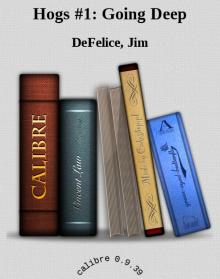 Hogs #1: Going Deep
Hogs #1: Going Deep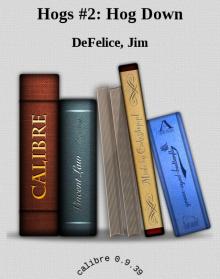 Hogs #2: Hog Down
Hogs #2: Hog Down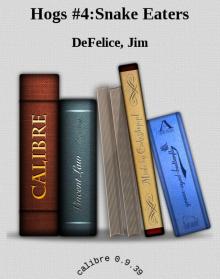 Hogs #4:Snake Eaters
Hogs #4:Snake Eaters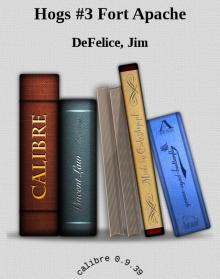 Hogs #3 Fort Apache
Hogs #3 Fort Apache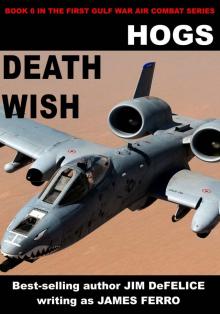 HOGS #6 Death Wish (Jim DeFelice’s HOGS First Gulf War series)
HOGS #6 Death Wish (Jim DeFelice’s HOGS First Gulf War series)